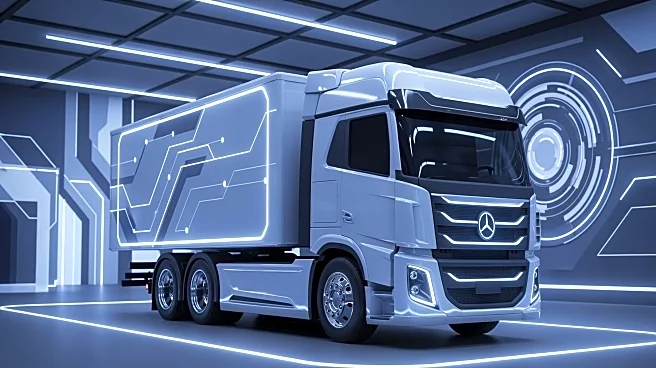What's Happening?
Paccar CEO Preston Feight has expressed optimism about the demand for Class 8 trucks in the U.S. and Canada for 2026, contingent upon regulatory clarity and improvements in the freight market. During a conference call following Paccar's third-quarter
results, Feight forecasted Class 8 sales between 230,000 and 270,000 units for the next year. This projection is based on anticipated regulatory clarity regarding emissions rules, specifically the Environmental Protection Agency's mandate for heavy-duty trucks to emit no more than 35 milligrams of nitrogen oxides starting with the 2027 model year. Feight noted the uncertainty surrounding the recovery of the truckload sector and the potential impact of changes in emissions regulations on pre-buy activities.
Why It's Important?
The forecasted increase in Class 8 truck demand is significant for the U.S. trucking industry, which has faced economic and regulatory challenges. Regulatory clarity, particularly concerning emissions standards, could stabilize the market and encourage investment in new equipment. This development is crucial for manufacturers like Paccar, as well as for fleets that have been cautious in their spending due to ongoing market uncertainties. A rebound in truck demand could lead to increased production, job creation, and economic growth within the sector. However, the industry's recovery is contingent upon the resolution of regulatory and economic uncertainties.
What's Next?
The trucking industry is awaiting further details on emissions regulations, which will influence purchasing decisions and market dynamics. Stakeholders are closely monitoring the Environmental Protection Agency's actions and any potential changes to the emissions standards. The industry is also watching for signs of recovery in the freight market, which will impact demand for new trucks. As regulatory clarity emerges, manufacturers and fleets will adjust their strategies accordingly, potentially leading to increased investment and production in the coming years.
Beyond the Headlines
The anticipated regulatory clarity could have broader implications for environmental policy and the trucking industry's role in reducing emissions. As manufacturers adapt to new standards, there may be increased focus on developing cleaner technologies and sustainable practices. This shift could drive innovation and reshape the industry's approach to environmental responsibility, aligning with broader societal goals for reducing carbon footprints and improving air quality.
















